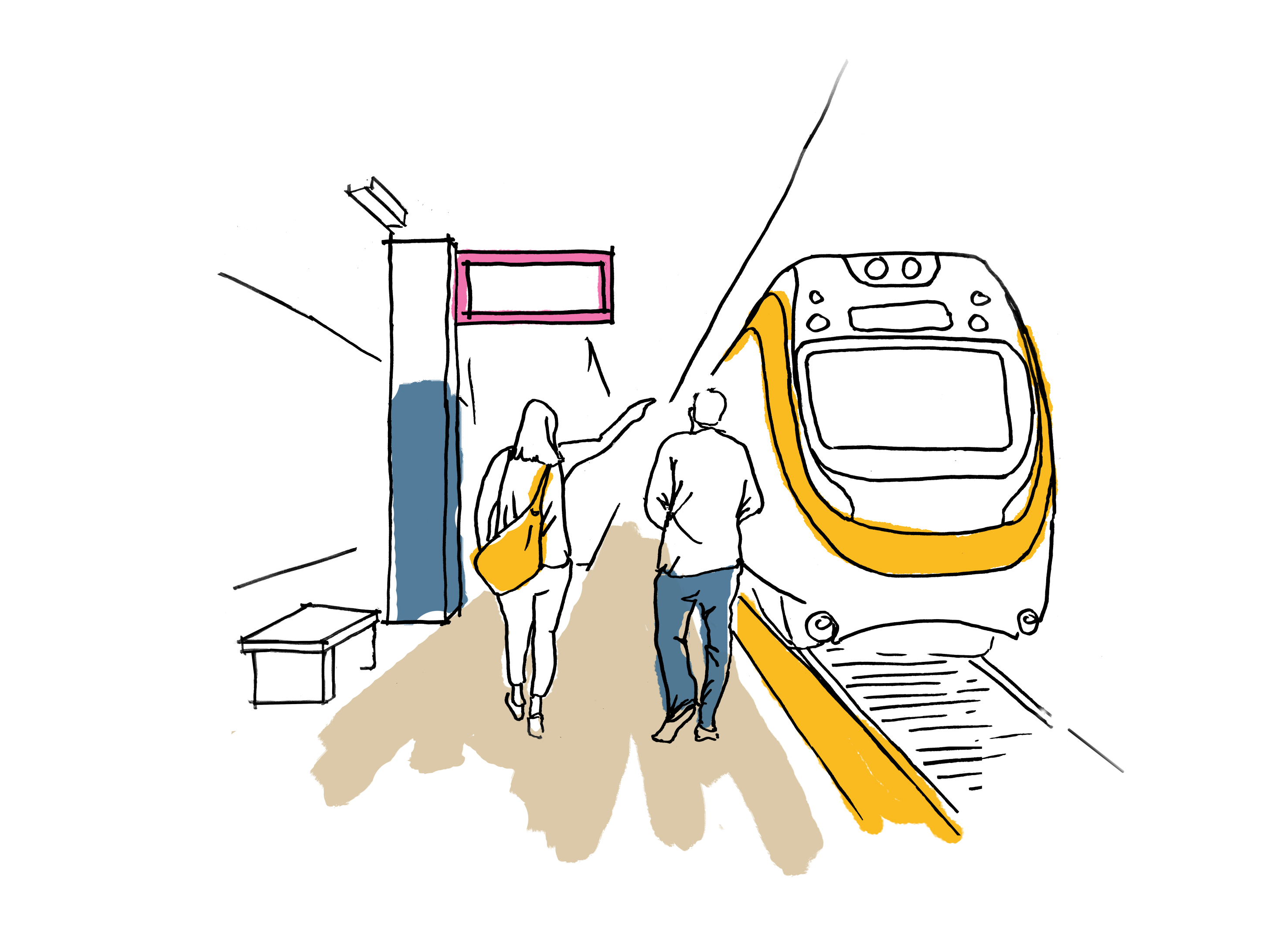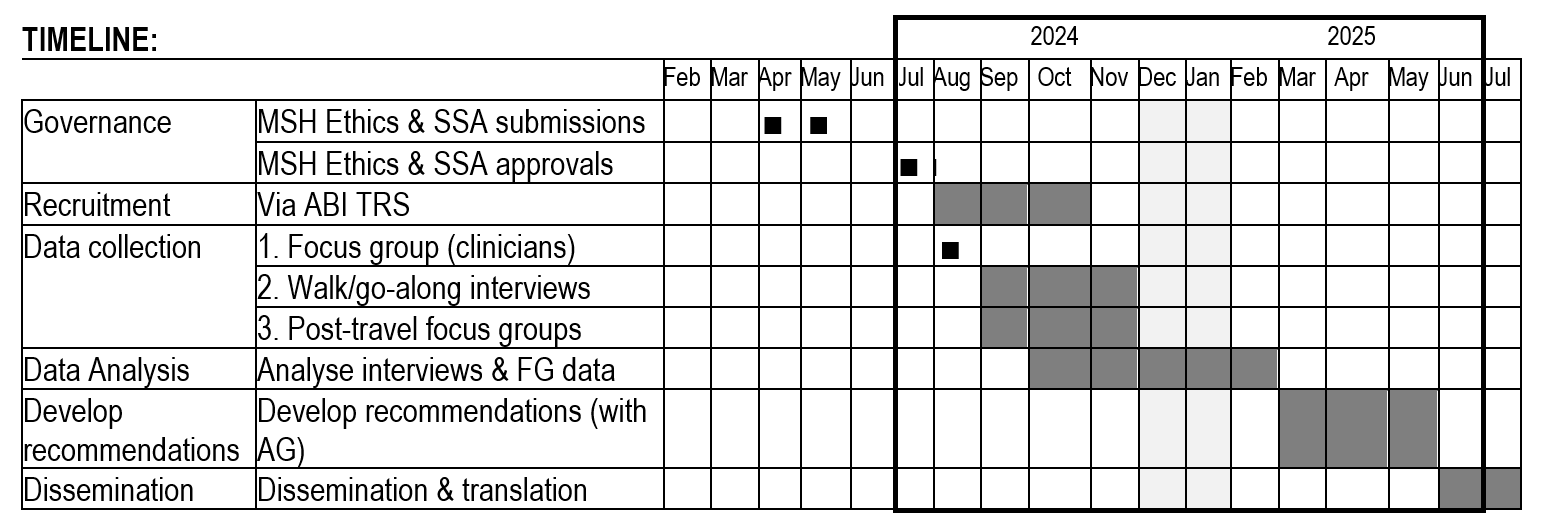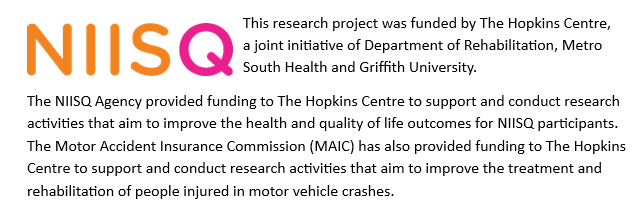SEED PROJECT: Navigating rail transport after acquired brain injury
About the Project
Chief Investigator: Louise Bassingthwaighte

Image credit: Izak Hollins
About
After an acquired brain injury (ABI), many people experience a period of ‘driving disruption’, where they are not medically cleared to drive and need to access the community through other means, including public transport. This project seeks to understand the experiences of people who have an ABI when using trains. The research team will undertake walk-along interviews with current and previous clients of the Acquired Brain Injury Transitional Rehabilitation Service while undertaking a journey from one train station to another. We will pay particular attention to challenges they encounter, strategies used to facilitate the journey, and how the design and layout of the train station environment influences their experience. We anticipate that insights from this exercise will both inform clinical rehabilitation practice for community access training, and enrich current knowledge of Universal Design, especially for populations with impaired cognitive functioning.
Aim and objective
There are two overarching aims of this study: (1) To investigate the experiences of people with moderate to severe ABI in accessing public transport environments/undertaking community access post-hospital discharge, and (2) To investigate the accessibility of suburban train station environments (including those with recently completed accessibility upgrades) for people with newly moderate to severe ABI in order to improve current understandings of best practice Universal Design of public transport infrastructure and systems.
Expected Outcomes
- To identify the experiences of people with moderate-severe ABI in navigating transport environments early in recovery, and how this:
- Can inform clinical practice for community access training with clients and
- Has potential to expand upon the existing knowledge base of Universal Design, especially for populations with impaired cognitive functioning.
- To lay the groundwork for a more detailed study with a larger participant cohort to expand the existing knowledge base regarding Universal Design of public transport infrastructure and systems (with a focus on Accessibility for travellers with cognitive impairments).
- This study will produce the following outputs: Minimum 1 paper published in a peer-reviewed journal; Presentation of findings at conference(s) and online webinar(s); integration of findings into ABI TRS clinical practice materials; Production of lay summaries aimed at differentiated professional audiences e.g. professionals designing public transport infrastructure, i.e. architects, engineers, transport authorities and policy makers.
Expected impact
- Clinical: By identifying participants’ experiences of navigating public transport early in recovery (and the strategies they use to facilitate this), study findings will benefit both rehabilitation clinicians and their clients with ABI who have community access goals/needs, with significant potential for translation to clinical practice. Within ABI TRS, findings will be incorporated into specific resources that support clients with their transport access goals during driving disruption (Return to Driving Workbook). We anticipate this will enhance the rehabilitation provided to ABI TRS clients and positively influence their outcomes. Dissemination activities (e.g., presentation at conferences, local forums, social media, publications) will specifically include information on and recommendations for translation and implementation, informing the clinical practice of broader rehabilitation providers beyond those involved in the study.
- Beyond clinical applications, the study will seek to identify the way in which the design of the public transport environment and systems can increase or decrease the functional accessibility for travellers with cognitive impairments. The timeliness of this research requires consideration. With significant growth in rail transport upgrading forecast on the SEQ network over the coming 5 years, including Cross River Rail and Logan to Gold Coast Faster Rail projects18, knowledge generated through this proposal has potential to directly influence best practice Universal Design to benefit a broader range of people with accessibility needs (including those with cognitive impairments). Dissemination opportunities include:
- Development of a design guidance document regarding Universal Design of public transport for people with cognitive impairment (specifically ABI) specifically targeting the professional audiences responsible for designing public transport infrastructure (architects, engineers, transport authorities and policymakers).
- Linking with Accessible Transport Network to facilitate a translation workshop including findings and implications for best practice Universal Design of future train stations (new and upgrade). Audience: Transport and Main Roads, Translink, Brisbane City Council, QRail and Cross River Rail.
People/organisations involved
- Metro South Health: Acquired Brain Injury Transitional Rehabilitation Service : Kerrin Watter, Mandy Nielsen, Stacy James
- The Hopkins Centre: Izak Hollins (THC Ambassador), Kelsey Chapman (Inclusive Futures), Louise Gustafsson, Coral Gillett
- Griffith University: Louise Bassingthwaighte
- Hassell Studio: Tanya Golitschenko
Project status and timeframe
Achieved:
- Ethics and governance approvals - MSH Ethics approval- HREC/2024/QMS/107807 (21/06/2024); Griffith University Ethics approval - GU Ref No: 2024/489 (10/07/2024)
- Project Advisory Group formed and commenced meetings
- Phase 1 focus group complete in October 2024
- Phase 2 Walk-along interviews: Commenced in March 2025 and will be completed by end of May 2025
Projected timeframe


View All Researchers

